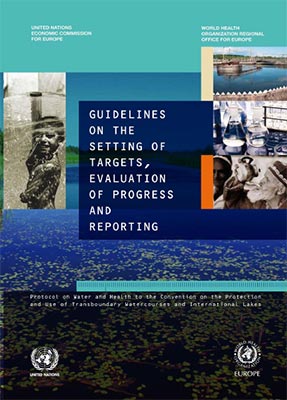
The implementation of the Protocol on Water and Health requires setting firm targets in the areas defined by paragraph 2 (a) to (n) of the article 6 of the Protocol. The process of target-setting entails analyzing the national situation, streamlining and harmonizing responsibilities and commitments in water and health. A realistic plan for improvement, with prioritized time-bound targets adapted to the national situation, must be elaborated. When complying with Protocol’s provisions, Parties are encouraged to tailor their targets accordingly to the country-specific problems.
The progress in setting targets and implementing the Protocol is assessed on the basis of summary reports provided by Parties. According to the article 7 of the Protocol, Parties shall collect and evaluate data on their progress towards the achievement of the targets and on indicators designed to show how that progress has contributed towards preventing, controlling or reducing water-related disease
 To assist Parties in setting targets, a Task Force on Indicators and Reporting was established in 2007, renamed Task Force on Target Setting and Reporting in 2010. The Task Force elaborated the Guidelines on the setting of targets, evaluation of progress and reporting under the Protocol. Moreover, the Task Force developed the format and reporting mechanism under the Protocol.
To assist Parties in setting targets, a Task Force on Indicators and Reporting was established in 2007, renamed Task Force on Target Setting and Reporting in 2010. The Task Force elaborated the Guidelines on the setting of targets, evaluation of progress and reporting under the Protocol. Moreover, the Task Force developed the format and reporting mechanism under the Protocol.Article 15 of the Protocol on Water and Health on review of compliance, requires the Meeting of the Parties to establish arrangements for reviewing compliance with the Protocol.The first Compliance Committee was elected in 2007 with the objective to facilitate, promote and secure compliance with the obligations under the Protocol, with a view to preventing disputes.
One important feature of the Protocol’s compliance mechanism is that it provides for the possibility of members of the public to make communications to the Compliance Committee on cases of alleged non-compliance with the Protocol, which the Committee is then required to deal with. To help the general public understanding the compliance mechanism the Committee elaborated Guidelines on communications from the public (Текст на русском языке доступен здесь).
- Assist Parties in developing an accurate analysis of their situation (enabling them to set targets under the Protocol),
- Provide recommendations to the Parties on how to improve their situation
- Assist Parties in seeking support from donors, specialized agencies and other competent bodies
Consultations do not have an inquisitive nature, and will be initiated by a request from a Party. Sessions can be held in confidence, if so requested. More information is available at the Terms of Reference of the consultation process adopted by the Committee at its 6th session.
The second reporting exercise in accordance with article 7 of the Protocol was held based in 2012/2013 on the decision of the Working Group on Water and Health at its fifth meeting (see ECE/MP.WH/WG.1/2013/2−EUDCE/1206123/3.1/2013/MOP-3/09).The outcomes of the reporting cycle demonstrated increased compliance with the guidelines and template for summary reports and improved overall quality of submitted reports as compared with the pilot reporting exercise conducted in 2009−2010.